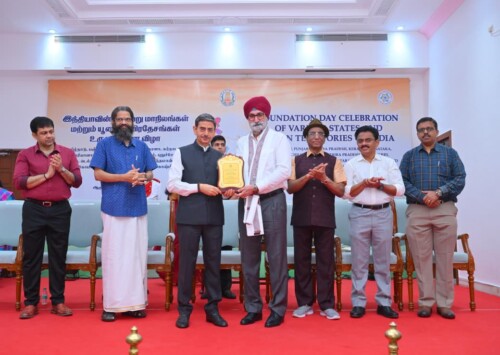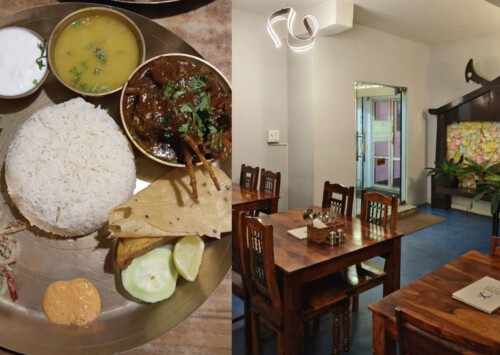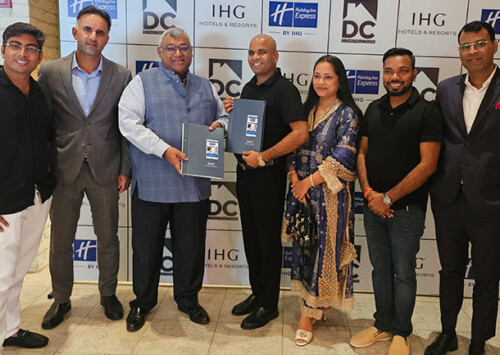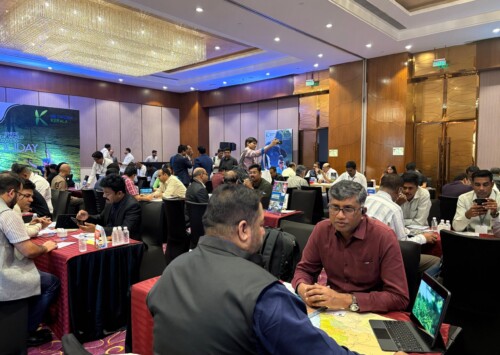New pathways needed to conclude EU-India FTA negotiations
Time for long-drawn talks to move to fast track
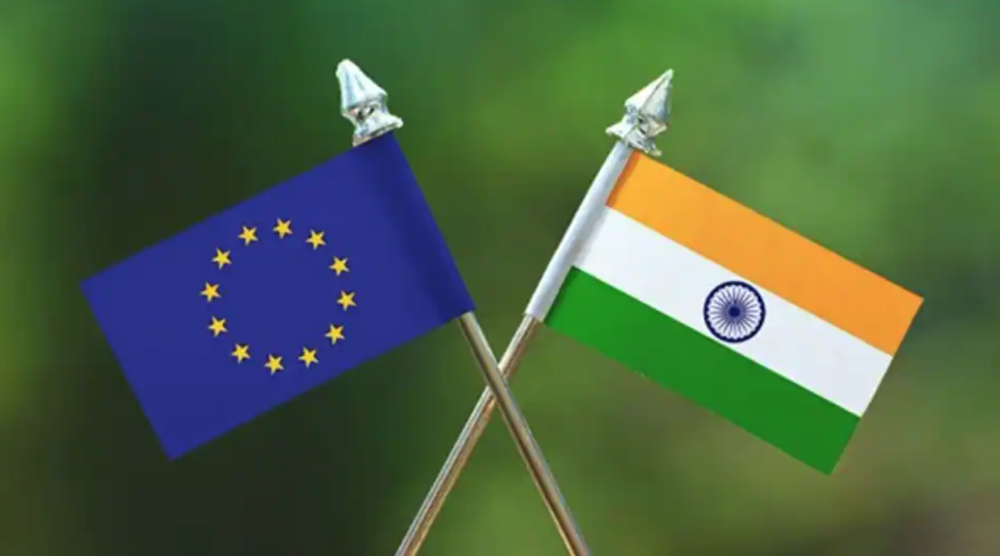
Deepening economic relations between the EU and India is essential for Indian and European companies
The European Union and India have been negotiating, on and off, a free trade agreement since the past 14 years. It is time to conclude the talks and reach an agreement as both sides need each other more than ever and time for talking is over and action is the need of the hour. An agreement can come with some innovative thinking by the EU, as well as India.

Deepening economic relations between the EU and India is essential for Indian and European companies
It was way back in 2007 that the European Union and India opened negotiations for a free trade agreement between the two regions as part of the Strategic Partnership between the two sides signed in 2004. Now, over 14 years later, the agreement is still nowhere in sight, even though the EU itself has metamorphosed from 27 to 28 and then again to 27 with Brexit last year. The FTA has also seen its nomenclature change as frequently as the team of negotiators on both the sides. It could perhaps stake the claim for being in the Guinness Book of World Records for the longest negotiations on a free trade pact in the world.
A free trade agreement between two countries or regions is about freeing the trade from tariff and other barriers in order to increase the traffic so that the benefit of the trade is not only shared by large and select companies but by the larger populations on both the sides. Also, those sectors of the economy which will see negative impact, how govt plans to set up “safety nets” to support them, is an issue for both India and EU.
Fortunately, both sides now seem to be primed for a quick revival of talks with adequate momentum to lead to results in a reasonable time frame in order to deepen ties across the entire spectrum. On the sidelines of G20 Meeting in Rome last month, the meeting between Indian Prime Minister Narendra Modi and EU President Ursula von der Leyen and EU Council President Charles Michel assumes importance for the FTA. Both sides seem to have decided to recalibrate the trade negotiation for a successful conclusion and the meeting is good news.
In this respect at a meeting of the third India-EU Strategic Partnership Review in Brussels in October, the two sides also discussed the launching of negotiations on a separate agreement on geographical indications, a label that protects goods that originate from a designated place and which are known to special qualities like the French Champagne, the Indian Darjeeling tea or the Basmati rice.
In an encouraging sign of continued momentum towards relaunch of the trade agreement, now called Bilateral Trade and Investment Agreement, earlier this week India and the European Union discussed steps to operationalise the decision of their leaders to resume negotiations for a trade agreement and also launch talks for a stand-alone investment protection pact.
The India-EU Leaders’ Meeting of May 8, 2021, which set a clear path for further deepening ties between India and the EU, allowed for a comprehensive review of the India-EU Strategic Partnership, guided by the India-EU Strategic Partnership: A Roadmap to 2025. India and the EU also discussed next steps to operationalise the decision of Indian and EU Leaders to resume negotiations for a ‘balanced, ambitious, comprehensive and mutually beneficial trade agreement’.
After 16 rounds of talks between 2007 and 2013, formal talks for the FTA were stuck over stark differences, as the EU insisted that India scrap or slash import duties on sensitive products such as automobiles, alcoholic beverages and cheese, among others. India’s demands included greater access to the EU market for its skilled professionals, which the bloc was reluctant to accede to. Subsequently, with neither side budging, the negotiations remained deadlocked. However, this seems to have changed and now both sides are committed to restart the negotiations on a fast-track basis.
The decision could not have come at a better time for both the sides since the evolution of geo-political situation in Asia offers an opportunity for India to deepen not just the trade and economic ties, but also geostrategic relations with the European Union, which has been India’s largest trading partner for years, accounting for more than 11 pc of total Indian trade.
New pathways to a speedy deal
Though the EU and India in their 15th Annual Summit last year committed to restart trade negotiations, they did not spell out a roadmap on how to break the eight-year-old logjam in talks which have been stalled since 2013, and if there is a sense of flexibility on either side to conclude the negotiations. In this respect, the recent statement by the Commerce Minister of India that the country is open to the idea of a Preferential Trade Agreement (PTA) with the EU to get faster outcomes before hammering out a more ambitious Free Trade Agreement (FTA) is significant.
In my view this is a big policy shift on the FTA regime by any country – plucking low hanging fruits and leaving thorny trade issues to be resolved with incremental approach. This approach should be suitable for both India and EU and therefore this is the most appropriate time to move forward and craft the agreement. Also, a series of economic and geo-strategic factors make the need for an economic deal more urgent.
Despite the disruptions caused by the pandemic to the global economy, the EU-India relationship is set to witness an extraordinary momentum. The impact of the pandemic may have knocked off India and pushed it back to being the world’s sixth biggest economy in 2020, the country is set to regain its position as the fifth-largest economy by 2025 and emerge as the third-largest economy by 2030 in dollar terms. India has tremendous potential as an export market for EU products and services and the country will continue to become an important source of global aggregate demand, or a significant consumer in the global marketplace. Therefore, it makes lot of economic, businesses and strategic sense for EU to rapidly secure a trade agreement with India, an economic superpower in the making, and integrate the economies of the two largest democracies and a combined market of 1.8 billion people.
It is essential that India’s growing relations with EU need to be supported by trade liberalisation by both sides and India should look at the Bilateral Trade and Investment Agreement (BTIA) beyond the narrow scope of trade and investment. The dramatic shift in how not just the EU, but also other major western nations, notably the USA, Canada, Australia, and Japan see China as the biggest threat rather than a partner as they had been seeing it over the past two decades, is an unprecedented window of opportunity for India to establish itself as a reliable economic, social, and strategic partner since most of the Western nations no longer see China as an irreplaceable trading partner and instead see it as a major economic and military threat.
With EU’s Comprehensive Agreement on Investment (CAI) with China on life support in the intensive care, India cannot afford to miss the opportunity to offer itself as the reliable trading partner. Geo-political developments are causing major adjustments in Global Value Chains (GVCs) and EU firms so far working with China are now looking for alternative locations for their operations. It is therefore advantageous for India to position itself not just a trusted political partner, which it already is, but also the go-to business partner as an open free and democratic market in the reforming post-Covid world order.
In this perspective, the BTIA has strategic importance, and it is a geo-political opportunity for peace and security in Asia-Pacific, and a geo-economic opportunity for entering free trade agreements with reliable trading partners around the world. As global power dynamic shifts, it is important that India and EU assert their roles in an emerging multipolar world and a closer economic cooperation can help the EU and India to achieve their ambitions.
Trade and investment continue to be the primary focus of India-EU relations and the BTIA can be the engine which will propel trade, investment and business and strengthen the backbone of India-EU relationship. It is true that negotiating a successful trade deal with EU which will impact the lives of 1.8 billion people is a complex and complicated exercise and requires a careful calibration of the difficult issues involved. However, it is hoped that both sides will innovate and come up with new ideas and find synergy to sort out the contentious issues. This will require a bold leadership, capable of taking difficult decisions with a visionary approach where “rigidity” has no place and “compromise” becomes the mantra of the negotiating mechanism.
Importance of EU for India
Deepening economic relations between the EU and India is essential for Indian and European companies, whose business links extend beyond import and export to include alliances and partnerships in supply chains, joint research projects and significant direct investments. The FTA thus will offer two largest democracies of the world working together to collectively change the geo-political and economic dynamics of the post-Covid19 world order. Europe is more than a market and India has a lot of stake in Europe. It is here where Indian entrepreneurs and business leaders find many things in common to do business. Also, Indian Diaspora of over 2.5 million has made Europe its home and it is set to contribute to the success of the FTA.
In the post-Covid world, the economic and social challenges India and EU face are daunting, but this moment should be recognised as an opportunity to take tough political decisions and make difficult compromises. With world governments increasingly resetting their approach to trade agreements in the post-pandemic world, it is important for EU and India to proactively step up their efforts to rejig their trade relations by overhauling their own negotiating strategies. Stakes are high for EU and India, and they need transformative change in their relations to play a larger role in the global trade and development. India and EU today need innovative new ideas to enhance their trade and economic cooperation; this being the key component for stronger partnership promoting economic growth in these troubled times.
I believe strongly in the wisdom of the strategic investment both EU and India have made in each other’s shared future since their strategic partnership agreement, and for India and the EU to maximise the return, both must take a longer-term view, keeping in mind the challenges of emerging broader geo-political and economic world order post-Covid, and their commitment on intense bilateral trade and investment relationship. The sooner both recommit themselves, and their partnership, to bring the 14 years of trade negotiations to a fruitful conclusion, the better for their economic prosperity.
I am of the view that both the EU and India have reached a crucial point where old paradigms of negotiating practices should be replaced, and new ideas brought on board. Both the sides need to look at their own history and find inspirations to crack complicated deals. For instance, in my view, the implementation of Goods & Services Taxin India was a more complex and complicated process and India should take the negotiation with EU as a similar challenge. Simiarly, the EU-India FTA negotiations have come to a stage where the EU could adopt some of the most efficient parts of the process followed during the much more complicated negotiations over Brexit.
A quick deal with the EU will create an incredible dynamic of innovation and material prosperity in India. I hope that given the ongoing stakes in the global economic disorder, New Delhi and Brussels together can lead the future of global trade by concluding the agreement.
The EU today is the world’s most formidable trade and economic block incorporating 450 million people in an integrated market and it has proved to be an extraordinary experiment in shared sovereignty creating a zone of peace. The integration of the EU is just not an obligation but a credible commitment which has transformed the EU as an extraordinary successful machine for generating prosperity. Inking an FTA with EU would be like creating a new trading block of 1.8 billion people. India’s ambition to increase its export to USD 1 trillion by 2030 cannot be fulfilled without inking free trade agreements and bringing further economic reforms that would help export.
(Sunil Prasad is the secretary general of the Europe India Chamber of Commerce (EICC), the apex trade body promoting Indian businesses in the EU. The views expressed here are the author’s own and do not necessarily reflect those of Media India Group.)

